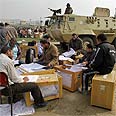
Had he been alive today, Muslim Brotherhood founder Hassan al-Banna would have been proud. Nearly 83 years after its founding, it appears that the Islamist organization's patience has finally paid off, after the group came away as favorites from Egypt's first round of parliamentary elections. While the elections still have two more rounds of polling, the preliminary results in Egypt's largest population centers of Cairo and Alexandria are a telling indicator of things to come.
After polls closed on November 30th, it appeared that Islamist parties have captured 120 of the 168 seats up for grabs in the first round of elections. The Brotherhood, represented by its Freedom and Justice Party (FJP) claimed 40% of the vote, while ultra-conservative Salafist groups came in second with 20%. The Egypt Bloc, a coalition of secular and Coptic Christian parties originally assembled to challenge the Islamists, came in third, beating out the long time favorite liberal Wafd party.
The rise of Islamist parties has been a primary concern since Western-friendly dictators began falling in rapid succession throughout the region in 2011. While Brotherhood-affiliated parties swept elections in Tunisia and Morocco, the first round of elections in Egypt was by far the most powerful and stark reminder of the influence and organizational capacity wielded by these groups.
Even before the campaigning season began, Egypt's secular parties were already defeated. In addition to their lack of political experience, the liberal and secular ideology of these groups only resonates with the minority of Egyptian society that is educated and well-to-do. These parties’ dire standing in Egyptian society was highlighted in August 2011 when the American embassy was scrutinized for its funding of various pro-democracy groups, eventually resulting in the resignation of the USAID representative.
While the country cried foul over perceived "American interference" in Egyptian politics, it did not criticize the large sums of money pouring in from wealthy Gulf nations such as Kuwait into the coffers of hard-line Islamists.
Using these funds, Islamists in Egypt have been hard at work, subtly rallying support for their newly created political parties using age-old tactics of offering charity and religious preaching. During the feasts of Eid el Adha, Muslim Brotherhood members were seen in Giza distributing lamb to impoverished residents - along with campaign flyers for their Freedom and Justice Party.
Global caliphate in cards?
Once polls opened up on November 28, Brotherhood members were outside nearly every polling station in Egypt's rural areas, distributing hot tea and political pamphlets - a blatant violation of Egypt's election laws, which forbid campaigning at polling stations. During the first round, more than 700 violations were reported, nearly all of them against the Muslim Brotherhood.
There is practically nothing Egypt's secular parties or military leadership can do to prevent Islamist domination in the future government. Since the fall of Mubarak, the caretaker military regime has tried desperately to implement supra-constitutional principles that would guarantee Egypt's secular nature before an Islamist-dominated parliament could draft a constitution calling for implementation of Sharia law. The efforts to implement those principles brought military rulers and Islamists to a loggerhead on November 18, when the Muslim Brotherhood organized mass demonstrations in Tahrir Square, sparking a wave of unrest that nearly brought about a second revolution.
Even though there are still two rounds of elections ahead, Egypt's secular parties have a minimal chance of rallying the rest of the country for a comeback. Despite reports of their large turnout and unity, Coptic voters only make up 8% of the population, while leftist and nationalist parties remain unwilling to cooperate out of various ideological disputes. The failure of the elections committee to penalize the Brotherhood for its blatant elections violations proved that it will not be weakened through any legal move.
With Islamist parties headed for a majority in parliament, only ideological divides between them can prevent Egypt from becoming an Islamic Republic. Despite their mutual affinity for conservative Islam, the Muslim Brotherhood and Salafist parties have had a recent history of disagreements.
Salafi parties not only disagree with the Brotherhood's more moderate brand of Islam, but also distrust the organization’s intentions regarding future power-sharing. The Brotherhood, on the other hand, understands that a coalition with hard-line Islamists would hamper Egypt's economy by hurting its image as a democratic country, hurting tourism, and undermining future prospects for foreign investment.
As it is on track to win less than a majority of votes, the Muslim Brotherhood may find itself looking to secular parties to form a coalition, postponing the advent of panic in the West of an Islamist takeover in the region's largest nation. However, it would be a mistake to assume that the Brotherhood's patience has now worn out. As it has done for decades, the Brotherhood will continue to slowly and subtly rise in power and influence, until one day the world would wake up to find that the entire region has become engulfed in a cohesive form of conservative Islam, powered by oil-revenues and united in its resolve. Indeed, the emergence of a global caliphate now seems as viable as ever.
The writer is an Argov Fellow for Leadership and Diplomacy at the IDC Herzliya. He works for Max-Security Solutions, a security consulting firm based in Tel Aviv















